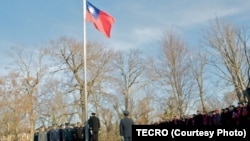Taiwan’s surprise hoisting of its flag in Washington this month may have been calculated to prove its strength to a restless public at home. Taiwan lacks formal relations with the United States, which recognizes China instead. Analysts say Taiwan wants to show it still has tight relations with Washington, a partner many voters on the island prefer over Beijing.
On New Year’s Day, Taiwanese officials in Washington raised their flag for the first time in 36 years. That act, at a ceremony attended by 100 people, was met with anger from China, which forbids its allies, including the United States, from allowing such displays from Taiwan. After the event, U.S. officials said they had no advance knowledge the flag would be raised at a residence formerly used by Taipei’s envoys to Washington.
While Taipei has downplayed the event and disclosed little about the intentions behind it, political analysts say Taiwan wanted to show off U.S. relations to voters at home who believe their government has grown too close to China.
Shane Lee, a political science professor at Chang Jung Christian University in Taiwan, said that while some among the public will find the flag-raising imprudent, others will see it as the government expressing its rights overseas.
“They think that we are a sovereign country and we should be able to raise our flag anywhere even though it’s on U.S. territory. Some people will justify it by saying it’s private property, so we can raise our flag on a private property,” said Lee.
China has claimed sovereignty over Taiwan since the Chinese civil war of the 1940s, and asks Beijing's more than 170 diplomatic allies around the world to bar any acts that indicate statehood for the self-ruled island. Taiwan itself has grown closer to China economically over the past seven years under the Taipei government of President Ma Ying-jeou. But Ma’s Nationalist Party faced a tide of criticism last year for its relations with Beijing. The party faces a tough presidential race next year.
Taiwanese worry that China will leverage growing economic ties eventually to bring the island under Beijing rule. They see the United States as a fellow democracy with the power to protect it militarily if China strikes.
President Ma has also improved Taiwan’s informal ties with Washington since he took office in 2008. Today Taiwanese can enter the United States visa-free and Taipei has received a series of high-level U.S. officials since 2012. Analysts say the Ma government saw the flag-raising as a way to direct attention to Taiwan-U.S. relations
Taiwan Foreign Ministry spokeswoman Anna Kao pointed only to broader Taiwan-U.S. ties when asked at a news conference about the flag-raising incident.
She said Taiwan’s officials in Taipei and in Washington will continue to carry out close communications with the United States. Kao added that attention now is being placed on development of long-term bilateral relations with the United States.
The ministry declined to say who planned the flag-raising and why it was done this year.
VOA’s Mandarin service reports that Taiwan had not raised its flag in Washington since 1979. That year the U.S. government switched diplomatic recognition from Taipei to Beijing. China’s Foreign Ministry warned the United States to prevent any more such acts. Analysts say the flag-raising will not affect relations among Taiwan, China and the United States in the long term.




